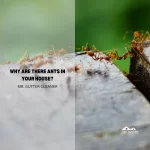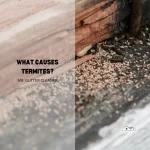Understanding what attracts ants to homes is crucial for effective home maintenance.
These small but persistent pests seek food, water, and shelter, turning unnoticed corners of a house into their haven.
Food residues, especially sugary and greasy substances, act as magnets for ant colonies, signaling an abundant resource for their survival.
Similarly, standing water from leaks or poor drainage provides the moisture ants need, while cracks and crevices offer perfect nesting spots.
Homeowners can counter these invasions by adopting stringent cleaning practices, sealing entry points, and ensuring dry, food-free environments.
This approach not only mitigates ant problems but also contributes to the overall upkeep of the home, aligning with the broader goal of maintaining a pest-free environment.
By addressing these attractants, homeowners gain insights into preventive measures, emphasizing the importance of cleanliness and maintenance in deterring ant infestations.
Understanding Ant Behavior
Ants are driven by their need for food, water, and shelter, which leads them into human habitats. These insects possess remarkable abilities to locate resources, necessitating homeowners to adopt proactive measures in home maintenance to prevent infestations.
Why Do Ants Enter Homes?
Ants enter homes in search of sustenance and protection. Crumbs, spills, and accessible food containers offer ample feeding opportunities, while the home’s warmth and moisture provide ideal nesting conditions. Recognizing these attractants is the first step in ant-proofing a residence.
How Do Ants Communicate and Find Food?
Ants utilize pheromones, chemical substances, for communication and to direct others towards food sources. When an ant discovers a food source, it returns to the colony, leaving a pheromone trail for others to follow. This efficient communication system can quickly lead to a significant number of ants invading a food source.
Common Attractants for Ants in Homes
Ant infestations in homes are primarily driven by the search for food, water, and shelter. Recognizing and managing these attractants can significantly reduce the likelihood of ant invasions, contributing to effective home maintenance.
Types of Food That Attract Ants
Ants are attracted to a wide range of food sources within homes, but they show particular preferences for specific types.
Sugary Substances
Sugary foods are among the top attractants for ants. Spilled drinks, fruit remains, and even small residues from sweet food items can quickly draw ants. Regularly wiping surfaces and storing sweet foods properly can help minimize this risk.
Proteins and Fats
Besides sugary foods, ants also seek out proteins and fats, which are often found in pet food, meat scraps, and cooking oils. Proper disposal of food waste and sealed storage of pet foods are essential steps in deterring ants.
Water Sources for Ants
Ants need water to survive, making any source of moisture a potential attractant. Leaky faucets, pipes, and even pet water bowls can attract ants. Fixing leaks and minimizing standing water can help keep ants at bay.
Shelter and Nesting Preferences
Ants seek shelter in protected, warm spaces. Cracks in walls, under floorboards, and inside insulation provide ideal nesting sites. Sealing these entry points can prevent ants from establishing colonies inside homes.
Identifying and Eliminating Attractants
Minimizing the factors that attract ants is essential in maintaining a home free from infestations. This section focuses on practical steps homeowners can take to deter ants by addressing common attractants.
Kitchen Hygiene Practices to Prevent Ant Infestations
Maintaining kitchen cleanliness is paramount. Ensuring that food spills are promptly cleaned, dishes are washed soon after use, and countertops are kept free of food residues significantly reduces ant attractants. Regular sweeping and mopping to remove crumbs and sticky spots also play a crucial role.
Proper Food Storage Solutions
Storing food in airtight containers is a highly effective way to keep ants away. This includes pet food, which should be kept in sealed containers and not left out in the open. Additionally, disposing of garbage regularly and using bins with tight-fitting lids can help prevent ant invasions.
Fixing Water Leaks and Eliminating Standing Water
Ants are attracted to moisture, making it crucial to fix leaky pipes and faucets. Eliminating standing water in and around the home, including the drainage trays under houseplants, also reduces the moisture that ants seek.
Natural and Chemical Ant Repellents
To safeguard homes from ant invasions, employing repellents is a crucial strategy. This section delineates between natural solutions homeowners can use with minimal impact on the environment and chemical repellents for more severe infestations.
Safe and Natural Ant Repellents
Natural ant repellents offer a safer alternative for households, especially those with pets and children.
Vinegar Solutions
Vinegar, diluted with water, acts as an effective ant deterrent due to its strong scent that disrupts ants’ scent trails. A solution of equal parts water and vinegar can be used to clean surfaces where ants frequent.
Essential Oils as Ant Deterrents
Essential oils, such as peppermint, tea tree, and lemon, are not only aromatic but also repel ants. A few drops in water can be used as a spray around entry points and kitchen areas.
When to Use Chemical Ant Baits and Sprays
For persistent ant problems, chemical repellents may be necessary. They provide a potent solution but should be used with caution.
Choosing the Right Chemical Repellents
Selecting ant baits and sprays that target the specific ant species invading your home is essential for effective control. Products should be placed away from human and pet reach.
Safety Tips for Using Chemical Repellents
Always follow the product instructions for safe use. Consider wearing gloves and ensuring adequate ventilation when applying sprays or setting baits.
Professional Ant Control Solutions
Seeking professional assistance becomes essential when ant infestations persist despite preventive measures. This section outlines when to consider professional help and what homeowners can expect from these services.
When to Call a Pest Control Professional
It’s advisable to contact a pest control professional when ant infestations are extensive, recurrent, or when ants pose a risk to health and property. Professionals offer targeted solutions that are not typically available to the general public.
What to Expect from Professional Ant Control Services
Professional ant control services begin with an assessment to identify the type of ants and the extent of the infestation. Based on the findings, experts devise a treatment plan that may include baiting, chemical applications, and recommendations for preventing future infestations. Safety measures for occupants and pets are a priority, with follow-up visits to ensure the effectiveness of the treatment.
Preventive Measures Against Future Ant Infestations
Implementing preventive measures is key to maintaining a home that’s resilient against ant infestations.
This strategy not only addresses current issues but also safeguards the home from future invasions.
Regular Cleaning and Maintenance Tips
Frequent cleaning is fundamental in ant prevention. This includes wiping down surfaces to remove food residues, sweeping floors to eliminate crumbs, and decluttering to reduce hiding spots for ants.
Regular maintenance checks to seal cracks and crevices can further deter ant entry
Landscaping and Outdoor Preventive Strategies
Landscaping practices can influence ant behavior. Keeping shrubbery trimmed and away from the home’s structure prevents ants from using branches as bridges. Additionally, managing yard debris and maintaining dry conditions around the foundation discourage ant nesting near the home.
FAQs About Ant Attraction and Control
Addressing common questions can provide homeowners with a clearer understanding of how to manage and prevent ant infestations effectively.
Can Ants Cause Damage to My Home?
Yes, certain species of ants can cause damage to your home. Carpenter ants, for instance, create nests inside wood, potentially compromising structural integrity. Immediate action is recommended upon detection to prevent significant damage.
Are Some Ant Species More Difficult to Control?
Indeed, some ant species pose more challenges in control efforts than others. Pharaoh ants, for example, are known for their ability to spread rapidly and create multiple colonies, making eradication more complex.
How Can I Identify the Type of Ants in My Home?
Identifying ants involves examining their physical characteristics, such as size, color, and behavior. Consulting with a pest control professional can provide accurate identification and recommendations for effective treatment strategies.


